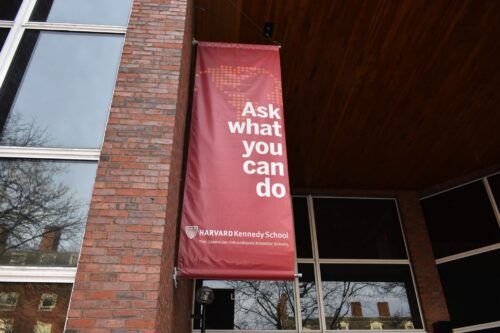IOP forums in context.
By PULKIT AGARWAL
In light of recent events across the political world—through a series of upheavals that started with Brexit and culminated in the election of President Trump last November—there has been a substantial decline in the credibility of public institutions. Interestingly, this trend has not been limited only to the bodies of government, but has also been salient among media, think tanks, and expert political opinion more generally. How does a body such as the Institute of Politics, then, reposition itself to both communicate its disillusionment with the current political environment, and keep people engaged in discussions on subjects of critical importance to the nation? We ask this question keeping in mind recent events at the JFK Forum, and seek to understand its implications in the near-term.
On Tuesday April 11, the forum hosted an event titled “The Road to Citizenship,” The 2017 Pollak Lecturer delivered by a retired Four-Star General of the United States Army and founder of the McChrystal Group, General Stanley McChrystal. The event was moderated by Dean and Don K. Price Professor of Public Policy at Harvard Kennedy School, Douglas Elmendorf, and although it did not entail a question-answer exchange of the conventional kind, it exemplified the Institute’s grappling with its reformed role on campus.
The General spoke at length on the subject of defining an attitude for citizenship, one which is built on “a culture of service.” Although many of his allusions to the possibility of a year of national service for young people aged 18-28, either civil or military, could have been obviously critiqued on standard grounds of individual liberty, this time they were accepted rather warmly by the audience. Liberals across the country have taken all-the-more willingly to the idea of picking up responsibility for civil institutions, it would appear, and undoubtedly, the IOP’s own purpose of engaging young people in public discourse is of paramount importance in times such as these. As the lecture asserted, the conversation about civic responsibility is one that young people across the nation ought to take seriously in a post-Trump world.
But there is more to this notion of citizenship that the IOP has attempted to advocate through several events this year. General McChrystal mentioned that the value of a resource “increases because it is not open to everyone.” In other words, citizenship is akin to membership to a club, an elite institution, or even an empire. It is a “valued privilege” that people ought to respect to maintain its desirability. Surely, there is reason to believe that such conceptions of citizenship— and by extension nationality—may be discriminatory; but to do so would be to miss a larger point, that is: for young America, the value of its civil institutions may erode over the course of the next few years if action isn’t taken now. This is not to say that the privilege of US citizenship, per se, must be kept from outsiders who seek it. It is merely a reflection of the task that this administration may leave future generations with, to preserve the desirability of this citizenship in the first place, and of the responsibility that all its bearers must accept.
It may not be unprecedented for the IOP to have endorsed such impassioned voices on the defense of public institutions, or even citizenship; after all, some would argue that is precisely the Institute’s mandate. But the environment within which it operates is vastly different today than it once was. The appointment of Gina McCarthy, President Obama’s EPA Administrator, as a Spring Fellow, of Ashton Carter, former Secretary of Defense, as head of the Belfer Center for Science and International Affairs, and many others, indicate the Institute’s continued efforts to not let its guard down like many others in the conversation have. It remains committed, clearly, to not succumb to a loud, fringe ideology, even if it may occupy power today. We must in turn play our part, and claim citizenship, responsibility, and action.
Pulkit Agarwal (pulkitagarwal@college.harvard.edu) asks the same questions in his own life that the Forum asks of its speakers.

